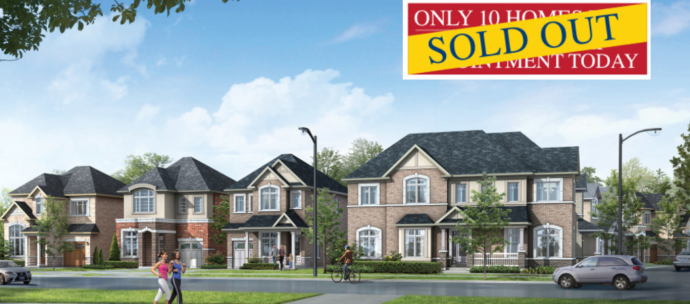 By Connor Fraser,
By Connor Fraser,
April 28th ,2022
BURLINGTON, ON
OPINION
Everyone is keenly aware of how unaffordable housing has become in our community and across other regions of the province. Many young people are now facing the reality of never being able to own in the region where they grew up. They are making tough decisions to live farther and farther away from work, and endure gruelling commutes that will impact their mental health and the environment. Darrell Bricker of Ipsos Public Affairs observed in a recent interview for the Ontario 360 Initiative that the outlook of Ontarians (and in particular young Ontarians) for their futures, has darkened, driven in large part by declining housing affordability.
While on the surface it may seem like just another issue, unaffordability has been created by diverse and complicated factors. Its costs are moreover sinister and threaten the future quality of life for all Ontarians.

There are very few locations where new single detached homes are being built – it is all high rise for Burlington going forward.
Since the 1960’s municipal zoning bylaws have set us on a collision course with this problem. Vast tracts of land are “locked up” with low-density, single-detached designations. Any attempt to introduce higher density (even modest 3 or 4 storey multi-units) are met with arguments of “neighbourhood character preservation” and ferocious opposition from existing homeowners. While “NIMBYs” perpetuate the problem and are convenient scapegoats, they are not responsible for decades-old zoning bylaws.
I am genuinely concerned that we have not learned any lessons in Ontario. Low-density urban sprawl continues at breakneck speeds. New development must be encouraged, but with an eye for much higher density and transit-oriented communities.
This connects with the second and perhaps most sinister and intractable cause of unaffordable housing: Significant numbers of Ontarian’s want low-density housing. The Anglo-American mindset romanticizes fierce independence and individualism. Unless you’ve got a driveway and your own tiny patch of grass, you’re not successful. Ironically, many of my friends who complain about skyrocketing prices are adamant in their desire to own a single-detached house. It’s understandable that many keenly aspire to a goal that was attainable for older generations – but I think it’s more important to realize that those goals may have been unsustainable. Regretfully, convincing so many that fulfilling lives may still exist within higher density settings (take Quebec as a good example) is a politically suicidal task.
 The costs of unaffordable housing are immense. The future economic growth (and in turn quality of life and government services) of Ontario and Burlington relies upon attracting top employees and firms. Many investments have been made to transform Toronto and the GTA into a technology hub and take advantage of the intangible economy. Expensive housing and long commutes threaten that transformation. They are major obstacles to those considering whether to make Ontario their home. If you’re someone opposed to urban intensification in Burlington or elsewhere, consider that in 30 – 40 years you’ll likely need and want timely and effective healthcare services. Who’s going to pay for it if those who would’ve lived here and created value with their talent, have been driven from the province by unaffordability, thereby crippling the tax base?
The costs of unaffordable housing are immense. The future economic growth (and in turn quality of life and government services) of Ontario and Burlington relies upon attracting top employees and firms. Many investments have been made to transform Toronto and the GTA into a technology hub and take advantage of the intangible economy. Expensive housing and long commutes threaten that transformation. They are major obstacles to those considering whether to make Ontario their home. If you’re someone opposed to urban intensification in Burlington or elsewhere, consider that in 30 – 40 years you’ll likely need and want timely and effective healthcare services. Who’s going to pay for it if those who would’ve lived here and created value with their talent, have been driven from the province by unaffordability, thereby crippling the tax base?
Rising home prices also open the door for populist leaders on the fringes of the political spectrum to gain power by capitalizing on anger. Under normal circumstances, such individuals would never be considered for public office. The federal Conservative leadership race has already seen examples of candidates trying to exploit anger over house prices and inflation for political gain.
I don’t see this problem being resolved in the near future. The composition of infrastructure changes very slowly, many aspire to live in low-density settings, and there are limited options for English-speaking young people in Canada: This is a slight simplification, but all the best jobs are in Toronto or Vancouver.
At the very least, the province must intervene by overriding municipal zoning bylaws to promote “missing middle” 3-4 storey multi-unit housing. Furthermore, the province could become more aggressive with mandating that all new development be higher density and transit oriented.

Could Perth, ON close to Ottawa with a lovely idyllic setting be made a larger community? The locals wouldn’t buy it
 Other options that should be explored include actively building out secondary urban centres within Canada, and making these locations attractive to live. Even within Ontario, there are many regions that might be targeted for significant growth, such as Windsor and Thunder Bay. With a limited number of serious economic hubs compared to the United States, we risk over-concentrating demand for housing to an extent that local actors cannot solve.
Other options that should be explored include actively building out secondary urban centres within Canada, and making these locations attractive to live. Even within Ontario, there are many regions that might be targeted for significant growth, such as Windsor and Thunder Bay. With a limited number of serious economic hubs compared to the United States, we risk over-concentrating demand for housing to an extent that local actors cannot solve.
The ultimate solution to this problem is compromise. On one hand, those in existing neighbourhoods should reflect that low-density housing was always an unsustainable, exclusive and very costly goal. Moreover, young people and those hoping to start families should reflect that remaining attached to an unsustainable ideal is going to make their lives unnecessarily difficult and unhappy. For the simple reason that many are unwilling to compromise, unaffordable housing is here to stay.
 Connor Fraser is a post graduate student at the University of Toronto enrolled in the dual Master of Global Affairs and Master of Business Administration program.
Connor Fraser is a post graduate student at the University of Toronto enrolled in the dual Master of Global Affairs and Master of Business Administration program.















Dave Turner,
I’m not going to disclose that information, its private and confidential, secondly its irrelevant. I’ve read so many articles that blame developers, blame foreign buyers, blame landlords and investors for this situation – all cannon fodder. You are missing my point, a housing strategy needs to address federal fiscal spending, otherwise the strategy is for the most part worthless. In my opinion it’s impossible for a such a strategy to be successful when billions of dollars are being pumped into the monetary system, those that do not own high quality assets have little chance of catching up. Again this is basic economics that we learned in university, those with the means know this. Don’t allow the political spin doctors to convince you otherwise.
Sir, nobody, not political spin doctors nor anybody else is brainwashing me to think a certain way, anymore than they are brainwashing you.
The reason I ask for some basic information about your rentals is that I wonder if your properties would be considered by most as “affordable”. I was looking at rental apartments on-line and saw the rent seemed to be between $2,000 and $2,500 a month. For context those rentals were basement apartment types not high rise condos. I do not consider $2,000 a month affordable. Do you?
Private developers are not going to build “affordable” or “low cost” housing, rental or freehold, because the profit is just not there. That has nothing to do with the affects of government pandemic spending. As you say, it’s all about economics. And the economics don’t make it worthwhile for the private sector.
I’ve been in the Burlington housing market since 1985, I bought my first duplex once I graduated engineering school while living at home! We then bought a condo in Banff, then a house in Burlington again. Things got busy with careers and family, but it became plainly obvious that with massive government spending during the pandemic, asset prices were going to rise, this is basic economics. We were then in the position to purchase a couple of houses, smart buying and avoided the typical multiple bids that go on in todays market. We put in our own elbow grease, did the renovations, rented them out quickly and have good tenants (and good investments). Here’s the deal, the government needs to stop running huge deficits, it drives up assets, and those with the means know it, and know how to capitalize on it. So, any housing strategy needs to put pressure, at the federal level to spend within their means. It’s a tough pill to swallow for the progressives, but there’s no free lunch. I get that there is demand being pumped up by immigration (no issue with immigration, my parents are immigrants), but governments need to get out of the way and allow building to proceed if we are going to bring in 400,000 immigrants into a country of 35M. Politicians can spin this problem any way they want, when investors (those placing real bets with their own money) see the government and central banks running the printing press, we know where to invest.
Mr. Hribljan
“we know where to invest” you say. Yes, I’m sure you do. And what is the aim of an investment? The aim is to maximize the rate of return on that investment. Hence why the big money investor builders develop higher priced condos or single family homes rather than “affordable” housing.
A question for you:- what are the sizes of the units you rent (sq. ft and number of bedrooms) and what is the monthly rent.
Until fairly recently, there has never been an identified need for a housing plan in Ontario unlike some other parts of the world. Many Gazette readers will be able to relate to “council houses” in the UK, part of the plan for the post-war years. In simplified terms, the plan was to build council-owned houses, with rent usually geared to income, as fast as possible to accommodate a growing population, providing a life-time home for those who wished to stay there or for others, a stepping stone to home ownership. The relatively few years my family lived in council housing in the UK allowed us to be able to afford to buy a house.
It is not realistic to expect developers to be part of a graduated housing plan. It is the role of government to identify needs, create a plan and allocate the means to execute it.
Canada and the UK cannot be compared in terms of housing and no single individual or public body/institution here can put a plan together. It requires a common will.
I believe you are agreeing with my suggestion here. Toronto Housing Corporation in effect mirrors the UK council house model.. Halton and other municipalities should follow that lead and seek funding from Federal and Provincial levels of government to finance the development and on-going management of the housing stock built.
Owning a home is not a g-d given right. My parents could not afford to buy a home. We lived in rental apartments in nice areas and I never thought my life was affected by this.
As a matter of fact I had no real desire to ever own a home. Owning a home as discussed previously comes with a lot of “worries and responsibilities”, and in many cases an ongoing financial burden.
There is never a guarantee that one would get a return on their investment. Presently the cost of housing has gone through the roof, however, there were times when you couldn’t sell your home at an asking price that would provide a return on the investment.
“Unaffordable housing”, I do not believe houses are sitting empty because nobody can afford them. The houses are affordable. But the quest of stumping for votes is never ending and the best tactic is to get a large demographic behind you, pick a bandwagon. The marketplace will and is sorting it all out. But saying that does not win any votes.
The cost of housing is merely a symptom. The real problem is excessive population – not only in the GTA but also on a small planet which can not support 8 billion humans.
If you have ever wondered what an elitist point of view look like – read this guy again.
Mr. Connor a good and thoughtful artlicle. Though in my opinion you miss addressing the biggest problem of all to getting affordable housing built. By affordable I mean, housing, rental or owned that can be acquired by the lower pay grade echelons of the workforce.
You need to ask yourself, why is it that developers, no matter their size, are not beating down the doors of the Provincial government to get the zoning and other land use regulation changes you have highlighted. The simple answer to that question is profit. There is considerably more profit to be had in single family homes and higher priced condos than there is in affordable housing.
The private sector is focused upon “return on investment”. Investors demand that. What is needed is a social housing development plan. The private sector should not to be expected to address social housing issues. That is a job for government.
I have suggested a solution here before without reaction from anyone whatsoever. Halton and other municipalities should take a lesson from Toronto and create a municipal housing corporation, similar to thevToronto Housing Corporation, to develop, build, own and manage an inventory of affordable housing , some on a rental basis and some on a condo ownership basis.
The Region must take control. Leaving it to the private sector to provide a solution is a non-starter. There is no incentive for the private sector to do it.
The region should look to get financing from the two upper tiers of government.
Mr. Connor, your thoughts on this please.
Your “putting down” of the ambition of many to be a single family home owner is wrong, misguided and lacking in understanding that we humans are all different and have different ambitions. None is right or wrong. Just different.
My elder niece is more than content to pay rent for a little condo box in a high rise tower in Liberty Village. She lives the buzz of the area. She does not want the worries or responsibilities that go with ownership. Her younger sister though wants to buy her own a single family home with a postage stamp size piece of grass.
Personally, I would not want to live in an environment where I get to share the cooking smells, coming from other apartments, or to put up with noise issues etc.
Your comments in this regard took away from your effort to draw attention to solving the real issue being “how to get affordable housing built”.
“Elitist”? Please explain, how someone pushing a socialist social housing proposal and who suggests wishing to own a single familiy home is not wrong is in you mind elitist ?
Not sure, bearing in mind how often you scold me and others for calling names, (e.g. when I used the word “iliterate” to describe another commenter) what gives you the right to call names. Double standard as always.
You likely will not publish this challenge to you.
” There is no incentive for the private sector to do it. ” The private sector is not just builders. It is home owners. I remember when nice starter townhomes were only 450k. Now, the price is way up. No matter what you make, when it comes time to sell, the owners want top dollar. I would and I, guess you do also? Make more cheap homes and at the first sale, they will not be “affordable” anymore (even though somebody did afford it by virtue of the sale). Premium locations possibly help the fast appreciation also.
I suppose I should get my head out of the sand and look around. Perhaps I am the problem?
I may not really know what is going on, as here I am on the weekend, working (taking a break for the moment), as per normal.